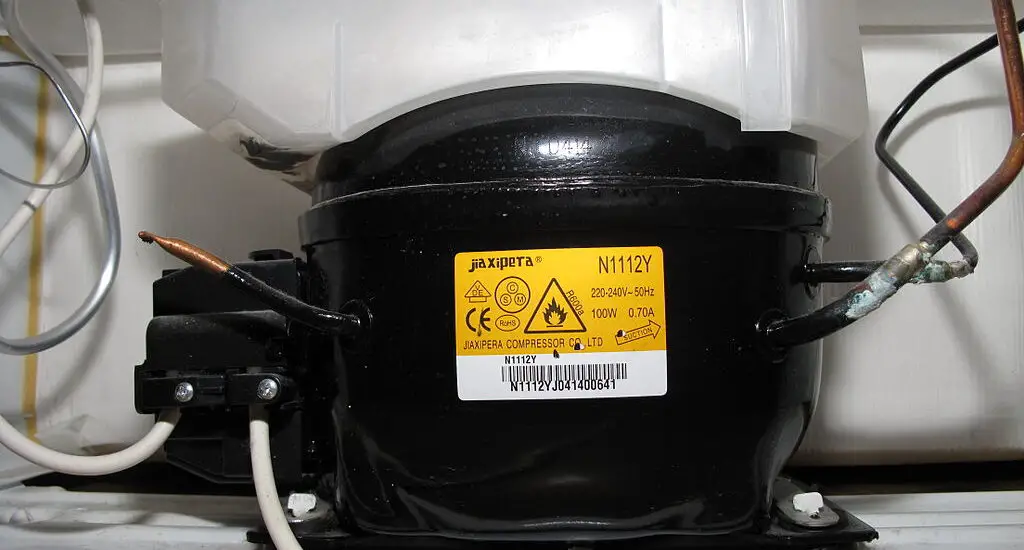Refrigeration compressor oil isn’t your everyday topic of discussion, yet it’s crucial to the smooth running of your cooling system. Serving as the lifeblood of your refrigerator, it lubricates, cools, and seals the compressor’s internal parts, keeping your chilled goods in tip-top condition. This article is your ticket to understanding everything about this often-overlooked yet essential substance.

Table of Contents
Introduction to Refrigeration Compressor Oil
Refrigeration compressor oil is a special type of lubricant used in the compressor of a refrigeration system. Think of it as the ‘secret sauce’ that keeps the heart of your fridge, the compressor, beating seamlessly. Without it, your fridge would simply grind to a halt.
Importance of Refrigeration Compressor Oil
But why all this fuss about compressor oil? It’s all down to three vital roles: lubrication, cooling, and sealing. Let’s break it down, shall we?
Lubrication
Picture your refrigerator compressor as a bustling city, with different parts playing their roles diligently. Without oil, these parts would be at constant friction, causing wear and tear. Compressor oil is the peacekeeper, minimizing friction and extending the life of these parts.
Cooling
Running a busy city generates heat, doesn’t it? The same goes for the compressor. Oil absorbs this heat, acting like a summer breeze on a hot day, preventing the system from overheating and breakdowns.
Sealing
Ever thought about what keeps the refrigerant gas from leaking? Bingo, it’s the oil! It helps seal the small gaps in the compressor, ensuring that the refrigerant stays where it needs to be. Pretty handy, right?
Types of Refrigerator Compressor Oil
Just like choosing the right motor oil for your car, picking the right compressor oil for your refrigerator is crucial. There are four main types of oils you’ll come across. Let’s take a closer look.
Mineral Oil
Mineral oil is the old faithful. This type of oil has been used in refrigeration systems for years. It’s reliable but doesn’t gel well with newer refrigerants. According to source.com, it’s perfect for traditional, older systems.
Alkylbenzene Oil
Alkylbenzene oil is a bit of a hot shot. This synthetic oil can withstand high temperatures, making it an excellent choice for systems operating in heat-demanding conditions.
Polyol Ester Oil
Polyol Ester Oil (POE) is a compatible partner for hydrofluorocarbon (HFC) refrigerants. If you have a modern HFC system, this oil could be your best bet.
Polyalphaolefin Oil
Got a specific refrigeration system? Polyalphaolefin (PAO) oil might be your go-to. Known for its excellent temperature range and lubrication properties, it’s used in specific applications.
Comparing Refrigerator Compressor Oil Types
So, how do these oils stack up against each other? Each has its strengths and limitations. What matters is finding the one that meets your system’s needs perfectly.
Check out these other related articles…
Fridge Compressor Max PSI: Everything You Need to Know
Refrigerator Compressor Hard Start Kit: Comprehensive Guide
Portable Ice Maker Compressor Not Working: How to Fix
Ice Machine Compressor Troubleshooting: Your Ultimate Guide
Refrigeration Compressor Tester: Your Comprehensive Guide
Choosing the Right Refrigeration Compressor Oil
Choosing the right oil is a bit like choosing the perfect pair of shoes. It needs to fit your fridge’s requirements, be compatible with the refrigerant, and ideally be kind to Mother Nature. Here’s how you can tick all these boxes.
Compatibility with Refrigerant
Like two peas in a pod, the oil and the refrigerant in your system must be compatible. The wrong pairing can lead to system failures and, in the worst case, a total breakdown.
System Requirements
Each refrigeration system has its own set of demands. And these demands extend to the type of oil used. So, take the time to understand your system’s requirements. Trust me, it’s worth it!
Environmental Considerations
Caring for the environment is no longer a choice but a necessity. Selecting an eco-friendly oil can reduce the environmental impact. After all, every little bit helps, right?
Regular Maintenance and Oil Changes
Maintenance is the key to the longevity of your refrigeration system. Regular oil changes ensure your fridge runs like a well-oiled machine. Literally.
Detecting Oil Issues
Early detection of oil issues can save you a world of trouble. Watch out for signs like an excessively noisy compressor or a fridge that’s not cooling properly. It could be crying out for an oil change!
Changing Refrigeration Compressor Oil
Changing the compressor oil in your refrigerator isn’t an everyday task, but it is doable. It’s somewhat akin to an oil change in your car but involves a few extra steps. Here’s a more detailed walkthrough, but remember, if in doubt, always call in a professional.
Preparing the Compressor
First, you’ll want to turn off and unplug your refrigerator. This reduces the risk of electric shock. Once that’s done, locate your compressor. It’s typically housed at the back of your refrigerator and covered by a panel. Remove this panel to gain access.
Draining the Old Oil
Now, here comes the slightly messy part. You’ll need to drain the old oil. To do this, locate the drain plug on the compressor and carefully remove it. Be sure to have a container handy to catch the old oil. Remember to dispose of this oil responsibly – your local recycling center can guide you on this.
Adding the New Oil
Once the old oil is completely drained, it’s time to add the new oil. Using a clean funnel, slowly pour in the new compressor oil. Be sure not to overfill – your refrigerator’s manual should give you the correct quantity. Once you’ve added the oil, securely replace the drain plug.
Reassembling and Testing
With the oil change complete, you can now replace the compressor’s cover. Plug your fridge back in, and give it some time to reach its operating temperature. Pay attention to any strange noises or issues with cooling. If everything seems fine, then congratulations, you’ve successfully changed your refrigerator compressor oil!